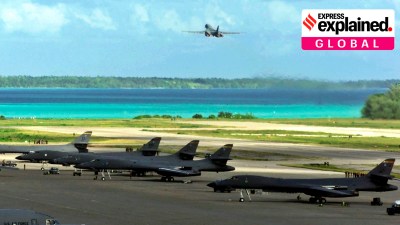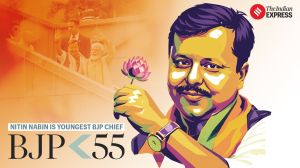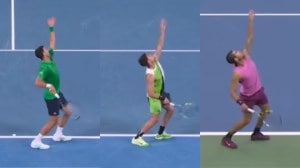General change for Musharraf
As President Pervez Musharraf is deliberating the future of Pakistan8217;s relations with India, the team of his closest military advisers ...

As President Pervez Musharraf is deliberating the future of Pakistan8217;s relations with India, the team of his closest military advisers include seasoned India watchers, more attuned to the strategic realities after September 11.
Musharraf himself is perhaps is the most experienced serving government of Pakistan official on India. Keeping track of military and political developments in India has been part of his job since 1994, when he was posted as director general for military operations DGMO at the General Headquarters GHQ.
Because of various retirements, transfers and postings, a new team of officers has replaced many key generals who advised General Musharraf when he went to Agra for his summit with Prime Minister Atal Behari Vajpayee in July 2001.
Since independence, the Pakistan army has played a critical role in the formation, promotion and protection of the nation8217;s Kashmir policy. The corps commanders generally participate in discussion on key national security matters such as Kashmir, but usually the chief of the army staff COAS discusses some specifics with his important military aides.
Mainly because of the stature and experience of Foreign Secretary Riaz Khokhar, the Foreign Office is currently enjoying 8216;8216;considerable influence8217;8217; in the decision making process. 8216;8216;Fortunately or unfortunately 9/11 injected a new paradigm in Pakistan8217;s Kashmir policy,8217;8217; noted a senior official.
Compared with the military team that advised him before and during the Agra summit, President Musharraf in his current peace drive is aided by associates who were not part of the army8217;s top decision-making hierarchy in July 2001. The new military aides are dealing with a completely different geo-political situation.
Analysts opine that in the most crucial geo-political change since Agra, a 8216;8216;Pakistan-friendly8217;8217; government in Afghanistan was replaced with the 8216;8216;less-friendly8217;8217; Hamid Karzai government and 8216;8216;anti-Pakistan8217;8217; Northern Alliance forces in Kabul.
During the last peace initiative in 2001, Lt Gen Mahmoud Ahmed, Lt Gen Aziz Khan, Lt Gen Muzaffer Usmani and Lt Gen Ghulam Ahmed heavily influenced Pakistan army policy on Kashmir. Also involved in decision making before the Agra summit was the present vice-COAS, Gen Mohammad Yusuf, then serving in the GHQ as chief of general staff.
In the present situation, Gen Yusuf is considered as the 8216;8216;most important8217;8217; military adviser. 8216;8216;His opinions on national security matters carry most weight with the president,8217;8217; a source said.
In Agra, Musharraf8217;s closest military adviser was his chief-of-staff Lt Gen Ghulam Ahmed, a thoroughly professional general who died in a traffic accident a few months after the Agra summit.
After Lt Gen Ahmed8217;s death, Lt Gen Hamid Javed, an armoured corps officer and soft-spoken intellectual, became President Musharraf8217;s chief of staff.
During the Agra summit period, President Musharraf8217;s closest strategic affairs adviser was the then ISI chief Lt Gen Mahmoud Ahmed, who sought premature retirement in October 2001. This vital position has since been given to Lt Gen Ehsanul Haq.
As the commander of corps 10, Lt Gen Mahmoud had conceived and executed the Kargil operation in 1999. As the COAS, General Musharraf has maintained Kargil actually forced the international community to redouble its effort for peace in south Asia.
Other new important military advisers to President Musharraf are the present chief of general staff, Lt Gen Tariq Majeed, holding the office which during the Agra summit was held by Gen Yusuf. And the present corps commander 10 corps Kashmir Lt Gen Ashfaq Kiyani, the position held by the now retired Lt Gen Jamshed Gulzar during Agra.
8216;8216;The present policy makers of the army are the people who observed and examined the impact of post-9/11 events on Pakistan from the front seat,8217;8217; observed a senior official, 8216;8216;Yet they know their limitations because only an honourable solution with India can be sold to the people.8217;8217;
Though he was one of the most important military advisers to the president during his last summit with Prime Minister Vajpayee, Gen Aziz Khan, the present chairman, joint chiefs of staff, advises the president at the institutional level. The president also holds separate consultations with PAF chief Air Chief Marshal Saadat Kaleem and naval chief Shahid Karimullah.
At a formal level the corps commanders will review the present status of talks between India and Pakistan at their meeting to be held soon after the SAARC summit. In the next corps commanders meeting, the military commanders will also determine the future strategy for talks with India.The News
- 01
- 02
- 03
- 04
- 05









![Kokrajhar [Assam], Jan 20 (ANI): Police deployed during a protest between two groups at National Highway, in Kokrajhar on Tuesday. (ANI Video Grab)](https://images.indianexpress.com/2026/01/kokrajhar.jpg?w=300)





















